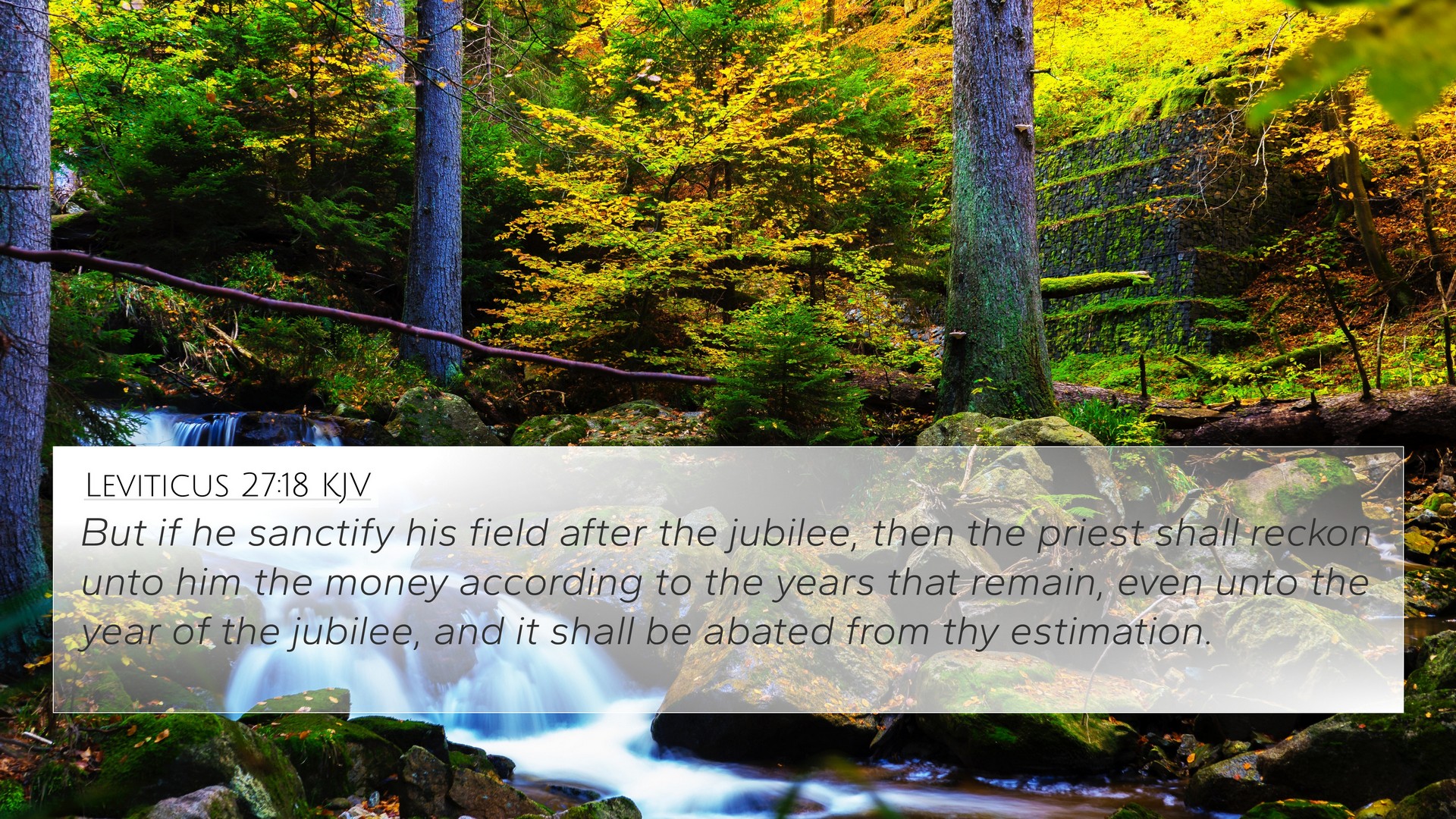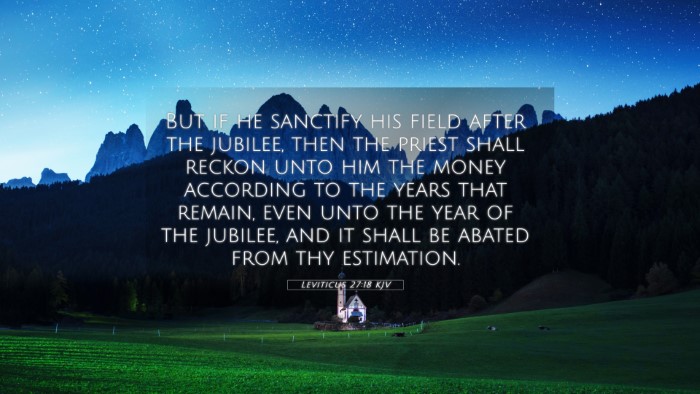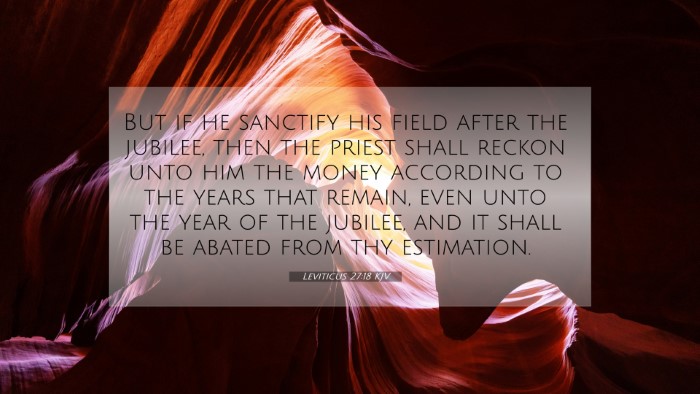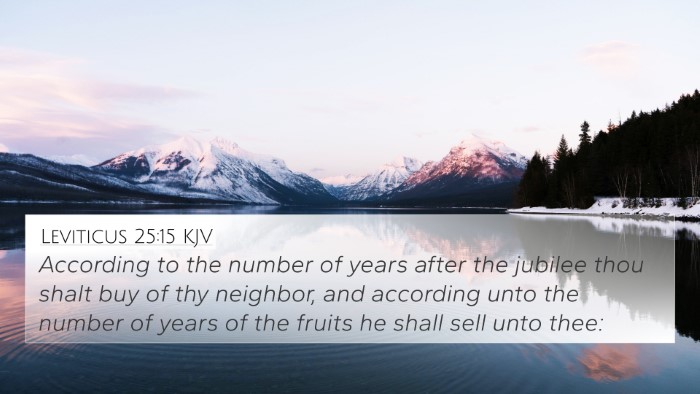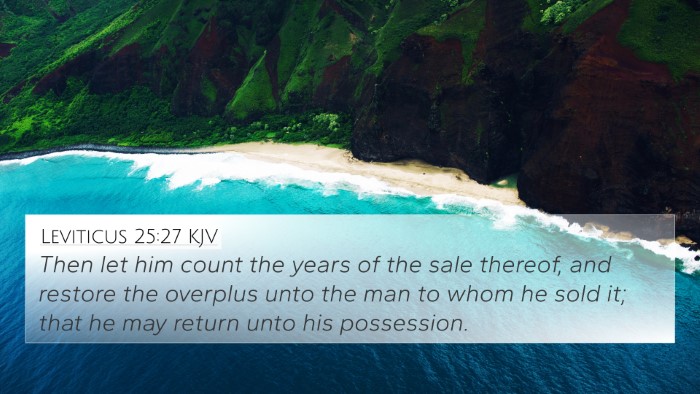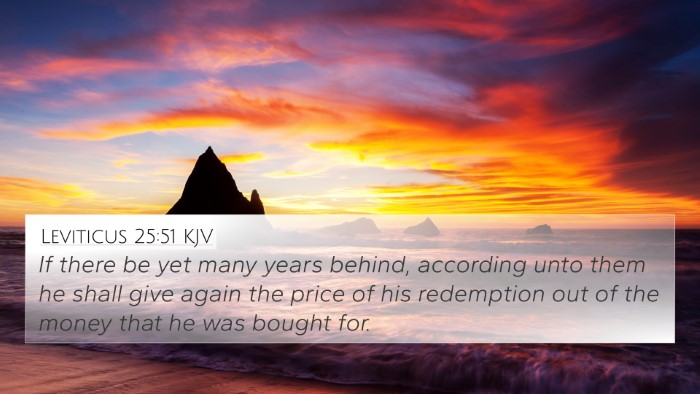Understanding Leviticus 27:18
Leviticus 27:18 states: "But if he sanctify his field after the jubile, then the priest shall reckon unto him the money according to the years that remain, even unto the year of the jubile, and it shall be abated from thy estimation."
Summary of Meaning
This verse speaks about the valuation of land that has been set apart for the Lord's use, particularly focusing on its sanctification and the implications in terms of valuation and the priest's assessment. The concept of the Jubile year plays a significant role, emphasizing redemption and the return of property to its original owners.
Contextual Overview
Leviticus is a book that outlines the laws and regulations for the Israelites as they establish their covenant relationship with God. Chapter 27 focuses on vows, particularly concerning property given to the Lord, and the stipulations related to ownership and redemption.
Commentary Insights
- Matthew Henry: Henry explains that the valuations made by the priest depended on the time remaining before the next jubilee. This showcases God's provision and fair assessment, emphasizing the principle of redemption at set times.
- Albert Barnes: Barnes highlights that the priest's estimation relating to the jubilee points to the cyclical nature of possession and divine order in the land. This offers insight into the importance of acknowledging God's ownership over the land.
- Adam Clarke: Clarke notes the spiritual implications, pointing to how these laws relate to the broader themes of restoration and redemption found in the entirety of Scripture.
Thematic Bible Verse Connections
This passage relates to several themes in Scripture, including redemption, stewardship, and the divine economy of ownership. Below are some key cross-references that highlight these themes:
- Exodus 21:2: Discusses the regulations for Hebrew servants and their release in the jubilee year, establishing a pattern of restoration.
- Leviticus 25:10: Introduces the jubilee year, underscoring the significance of land restitution and freedom.
- Numbers 36:4: Relates to inheritance laws, directly affecting land ownership and familial legacy.
- Isaiah 61:1-2: Connects to the theme of redemption, portraying God's mission to restore and free His people.
- Matthew 19:30: Talks about rewards in the kingdom of heaven, drawing parallels to sacrificing earthly possessions.
- Luke 4:18-19: Refers to Jesus’ mission, which echoes the jubilee's themes of release and restoration.
- 1 Corinthians 6:19-20: Emphasizes ownership and stewarding resources as a reflection of God's sovereignty over our lives.
Cross-Referencing Bible Texts
To grasp the interconnectedness of Biblical ideas, one might utilize various tools for cross-referencing. Here are some methods to enhance your understanding:
- Bible Concordance: A useful reference tool for locating verses and identifying connections between different scripture passages.
- Bible Cross-reference Guide: Helps readers find related verses that shed light on similar themes and teachings.
- Cross-reference Bible Study: An approach to study scripture that encourages linking verses to develop a deeper understanding of Biblical narratives.
How to Utilize Bible Cross-references for Deeper Insights
When aiming to understand scripture profoundly, consider the following approaches:
- Identifying Connections Between Old and New Testament: Understanding how the themes in Leviticus resonate with teachings in the New Testament enhances the scriptural narrative.
- Comparative Study of Pauline Epistles: Analyzing how Apostle Paul addresses subjects of law, grace, and redemption can enrich one's comprehension of this text.
- Cross-referencing Psalms with New Testament Teachings: This method reveals thematic parallels that illuminate the text's spiritual significance.
Conclusion
The examination of Leviticus 27:18 reveals deep theological and practical implications concerning ownership, responsibility, and God’s redemptive nature. By approaching scripture with an eye for cross-references and thematic connections, a more holistic understanding emerges, enriching one's spiritual journey.
